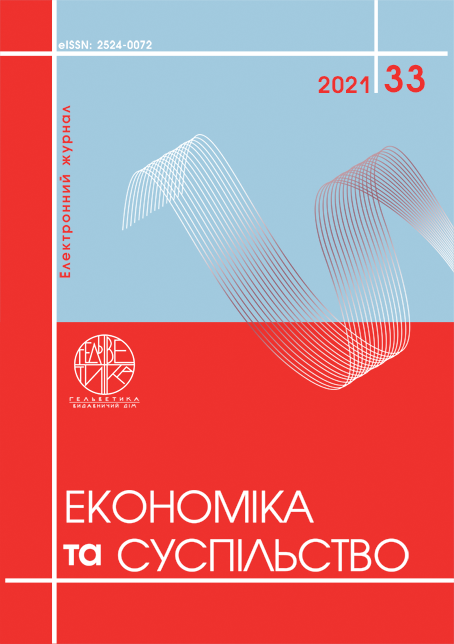THE IMPLEMENTATION OF GENDER-ORIENTED BUDGETING IN THE FISCAL POLICY OF STATE: RECOMMENDATIONS FOR UKRAINE
Abstract
The purpose of this article is to substantiate the further expanded implementation of gender-oriented budgeting in the fiscal policy of Ukraine in order to achieve gender equality within the society. The implementation of gender-oriented budgeting in Ukraine, which was initiated by international organizations and found support at the local and then at the state level, aims to reduce gender gaps in Ukraine and provide conditions for fairer and more transparent budget management. The topicality of this article is conditioned by the growing popularity of the practices of gender-oriented budgeting and the current socio-economic crisis in the country caused by the COVID-19 pandemic, which invokes the revision of the fiscal policy in Ukraine in order to improve the national economy and promote gender equality. The article is based on a review of existing Ukrainian and Western academic literature and on the analysis of the reports published by the International Monetary Fund and Razumkov Centre. The results of the research demonstrate the importance of fiscal policy for the socio-economic development of the state and the current situation with Ukraine’s economy. The place of gender-oriented budgeting in the fiscal policy of the state is established and characterized. It is determined that gender-oriented budgeting is more effective if the revenue side of budgets is formed taking into account gender aspects. It was found that, today, the fiscal policy in Ukraine needs to be adjusted with the extended use of gender-oriented budgeting if gender gaps are to be closed. The authors give recommendations for expanding the use of gender-oriented budgeting in Ukraine in the direction of implementing a gender-oriented approach to the accumulation of budget revenues. The study has its limitations since the authors did not collect primary data and only secondary sources were analysed. The findings are likely to be useful for those who work with gender-oriented budgeting and the design of fiscal policy. The article may also be of interest for researchers, public servants, government representatives and practitioners who deal with budgets, the budget process, public financial management and gender equality issues.
References
Карпич А.Ю. Теоретичні підходи до визначення категорії «ґендерно орієнтоване бюджетування» в українській науковій думці. Економіка та суспільство. 2021. №24. DOI: https://doi.org/10.32782/2524-0072/2021-24-41
Лютий І. Осецька Д. Соціальні пріоритети фіскальної політики в посткризовий період. Вісник Київського національного університету імені Тараса Шевченка. Економіка. 2014. Вип. 1(154). С. 28-33.
Пищуліна О., Юрочко Т., Юрчишин В. Соціально-економічні наслідки коронакризи. Київ, 2021. Разумков Центр : [сайт]. URL: https://razumkov.org.ua/uploads/article/2021_Socialno-Ekonomichni_naslidky_koronakryzy.pdf.
Смірнова В. О. Політична воля як чинник державотворчої діяльності: об’єктивні та суб’єктивні детермінанти : монографія. Київ : Логос, 2019. 384 с.
Bojičić-Dželilović V., Hozić A. A. Taxing for inequalities: gender budgeting in the Western Balkans. Review of International Political Economy : RIPE. 2020. № 27(6), P. 1280-1304. DOI: https://doi.org/10.1080/09692290.2019.1702572
Gender Budgeting in G20 Countries : IMF Working Paper 21/269 / V. Alonso-Albarran. International Monetary Fund : [сайт]. URL: https://www.imf.org/-/media/Files/Publications/WP/2021/English/wpiea2021269-print-pdf.ashx.
McConnell C. R., Brue S. L., Flynn, S. M. Economics: Principles, Problems, and Policies (18th ed.). New York: McGraw-Hill/Irwin, 2008. 880 р.
Stotsky J. G. Gender budgeting : fiscal context and current outcomes : IMF Working Paper 16/149. International Monetary Fund : [сайт]. URL: https://www.imf.org/external/pubs/ft/wp/2016/wp16149.pdf.
Karpych, A. (2021). Teoretychni pidkhody do vyznachennia katehorii “genderno oriientovane biudzhetuvannia” v ukrainskii naukovii dumtsi [Theoretical approaches to the definition of the “gender oriented budgeting” in Ukrainian economic thought]. Ekonomìka ta suspìlʹstvo, (24). DOI: https://doi.org/10.32782/2524-0072/2021-24-41 (in Ukrainian)
Lyutyy, I. & Osetska, D. (2014) Sotsialni priorytety fiskalnoi polityky v postkryzovyi period [Social priorities of fiscal policy in post-crisis period]. Bulletin of Taras Shevchenko National University of Kyiv. Economics, 1(154), 28-33 (in Ukrainian)
Pyshchulina, O., Yurochko, T., Yurchyshyn, V. Sotsialno-ekonomichni naslidky koronakryzy [Socio-economic consequences of the coronavirus crisis]. Retrieved from https://razumkov.org.ua/uploads/article/2021_Socialno-Ekonomichni_naslidky_koronakryzy.pdf (in Ukrainian)
Smirnova, V. O. (2019). Politychna volia yak chynnyk derzhavotvorchoi diialnosti: obiektyvni ta subiektyvni determinanty [Political will as a factor of state-building activity: objective and subjective determinants]. Logos. (in Ukrainian)
Bojičić-Dželilović, V., & Hozić, A. A. (2020). Taxing for inequalities: gender budgeting in the Western Balkans. Review of International Political Economy : RIPE, 27(6), 1280-1304. DOI: https://doi.org/10.1080/09692290.2019.1702572
Alonso-Albarran, V., Curristine, T., Preston, G., Soler, A., Tchelishvili, N., & Weerathunga, S. (2021). Gender Budgeting in G20 Countries. (Vol. 21/269). International Monetary Fund. Retrieved from: https://www.imf.org/-/media/Files/Publications/WP/2021/English/wpiea2021269-print-pdf.ashx
McConnell, C. R., Brue, S. L., Flynn, S. M. (2008). Economics: Principles, Problems, and Policies (18th ed.). New York: McGraw-Hill/Irwin.
Stotsky, J. G. (2016). Gender budgeting : fiscal context and current outcomes (Vol. 16/149). International Monetary Fund. Retrieved from: https://www.imf.org/external/pubs/ft/wp/2016/wp16149.pdf


